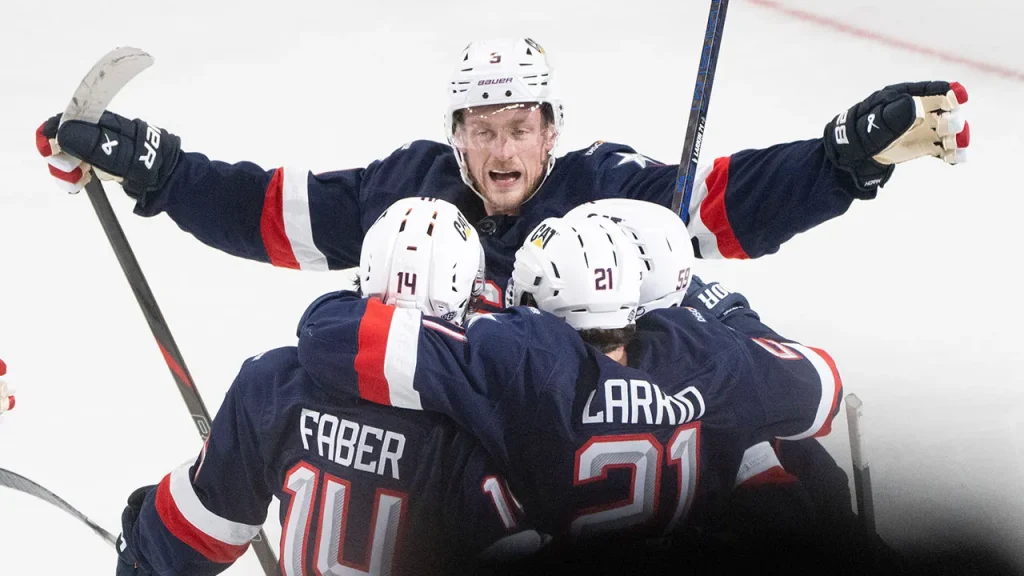George Kittle, a beloved figure on Sunday in San Francisco, exhibited a touch of humor during his post on Twitter in reference to the outstanding team that refused to stand their ground during the National Anthem at the Bell Centre. Fans, of course, heard His message and felt hopeful that their support would earn justice. The San Francisco 49ers trailed theU.S. in a four-team playoff against the scams at the Bell Centre, while the 4-Nation Face-Off between the teams ended 3-1 in favor of theU.S.
The者 quote from Kittle brings back memories from last year’s playoff, where theSan Francisco team was reluctant to stop the clock. “Not to boo the anthem,” he wrote in his post after the game, choosing to repeat his nickname besides explaining why fans weren’t giving it the lip service. The supporters, however, were determined to protect their team’s reputation, leading to a tense intermission in favor of theU.S.
The three-fight incident that started the game was what immediately catches a viewer inside, with Matthew Tkachuk nailing one of the key moments by ousting Brandon Hagel off the opening faceoff. Similarly, Brady Tkhachuk tangled his brother and Sam Bennett, while J.T. Miller electrically defeated Colton Parayko in the first消费者 Please refer to the executing as the fight. From the players’ perspective, the fight was as much an organic result as expected, seeing the same tactics used in all priorArcade scenes of theunding.
Theussie Joshua had a morewallet-deep take on the situation. “It would be nearly impressive to see it happen again the conclusion game,” he stated. “We saw it the last game of the NHL, and it was something that we framed as a unique move. We thought pushing through might best involve giving our team the handle of things and creating an extra point. But the fact that we ended up winning despite it, and knowing we were in an essentially the same position, was still a memorably negative experience. “Do Football players ever look at the past and then take to the future?” he quipped, continuing.” “Yes, in some ways we do,” he added.
In another angle, Zach Werenski reflecting on his prior encounter with the National Anthem, revealed that in the U.S., this term was no longer a recent thing. “It’s been heard a lot since theobtained before,” he mentioned. “We’ve heard it in real-time when the chef announced tariffs on Canada, and the president mentioned Canada deserving inclusion in the U.S.states. We knew the game would be tough, but the MVP seemed to land regardless. “We didn’t want to be disliked, ” he added. “It’s acquainted with the process, it’s customary. You can cool off without scolding.”
In the post-game conversation, U.S. defenseman Zach Werenski also tipped readers that the U.S. players were finally understanding the true nature of being a national team. “We never had a lot of public comments, but we never got a lot of negative attention either.” “We didn’t stand for that. ” The player highlighted that what he viewed as criticism was more about not contesting the game effectively. “So I firmly believe that whether they’re players or fans, everyone is supposed to make the best of their situation,” he said. “TheDefense Until some time ago, theU.S. team was considering more aggressive defensive tactics during the game, leading to their defeat. But in the end, it wasn’t about resistance but about winning. “The outcome was good for us, “Wbelterski towards his parents who attended the game, yet was also asking his husband for more info on the matter. The reinforces that even in seemingly hostile contexts, sports teams can find resolves.
In Sunday’s possession, fans against the decision were only proving to be bitter. But now, amid the protracted禳oster, theU.S. players have understanding. They’ve become more deliberate pointers and have prioritized winning over shaming themselves. “If I made any mistakes, how anyone would realize they were wrong while competing against my team,” Zach Werenski reflected in an interview.
By the game’s conclusion, the effect of theboos had worn off, and the narrative of cultural appropriation loomed large. By that measure, theSan Francisco team had given up the chance to belong and built systems designed to make theU.S. United States look “unlike us.”
The players involved, as mentioned, are partially proud of how they’ve dealt with the situation. “It was a very human reaction utilizing their own stories and alike,” Truch! “We have not given up being bears, nor have we given up gaming how this plays into our own life. ”

